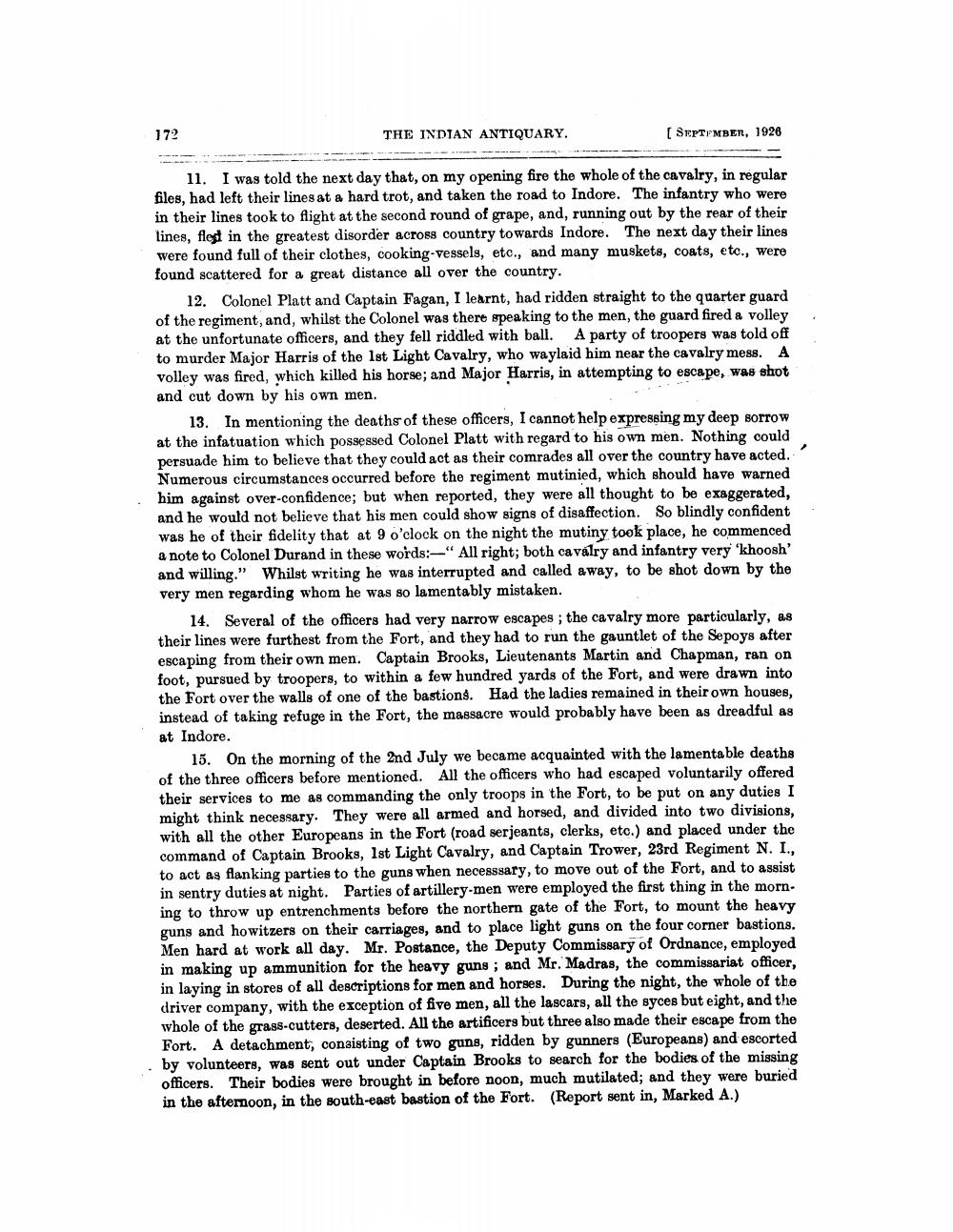________________
172
THE INDIAN ANTIQUARY.
[ SEPTEMBER, 1926
11. I was told the next day that, on my opening fire the whole of the cavalry, in regular files, had left their lines at a hard trot, and taken the road to Indore. The infantry who were in their lines took to flight at the second round of grape, and, running out by the rear of their lines, flest in the greatest disorder across country towards Indore. The next day their lines were found full of their clothes, cooking-vessels, etc., and many muskets, coats, etc., were found scattered for a great distance all over the country.
12. Colonel Platt and Captain Fagan, I learnt, had ridden straight to the quarter guard of the regiment, and, whilst the Colonel was there speaking to the men, the guard fired a volley at the unfortunate officers, and they fell riddled with ball. A party of troopers was told off to murder Major Harris of the 1st Light Cavalry, who waylaid him near the cavalry mess. A volley was fired, which killed his horse, and Major Harris, in attempting to escape, was shot and cut down by his own men.
13. In mentioning the deaths of these officers, I cannot help expressing my deep sorrow at the infatuation which possessed Colonel Platt with regard to his own men. Nothing could persuade him to believe that they could act as their comrades all over the country have acted. Numerous circumstances occurred before the regiment mutinied, which should have warned him against over-confidence; but when reported, they were all thought to be exaggerated, and he would not believe that his men could show signs of disaffection. So blindly confident was he of their fidelity that at 9 o'clock on the night the mutiny took place, he commenced a note to Colonel Durand in these words:-“ All right; both cavalry and infantry very 'khoosh' and willing." Whilst writing he was interrupted and called away, to be shot down by the very men regarding whom he was so lamentably mistaken.
14. Several of the officers had very narrow escapes; the cavalry more particularly, as their lines were furthest from the Fort, and they had to run the gauntlet of the Sepoys after escaping from their own men. Captain Brooks, Lieutenants Martin and Chapman, ran on foot, pursued by troopers, to within a few hundred yards of the Fort, and were drawn into the Fort over the walls of one of the bastions. Had the ladies remained in their own houses, instead of taking refuge in the Fort, the massacre would probably have been as dreadful as at Indore.
15. On the morning of the 2nd July we became acquainted with the lamentable deaths of the three officers before mentioned. All the officers who had escaped voluntarily offered their services to me as commanding the only troops in the Fort, to be put on any duties I might think necessary. They were all armed and horsed, and divided into two divisions, with all the other Europeans in the Fort (road serjeants, clerks, etc.) and placed under the command of Captain Brooks, 1st Light Cavalry, and Captain Trower, 23rd Regiment N. I., to act as flanking parties to the guns when necesssary, to move out of the Fort, and to assist in sentry duties at night. Parties of artillery-men were employed the first thing in the morning to throw up entrenchments before the northern gate of the Fort, to mount the heavy guns and howitzers on their carriages, and to place light guns on the four corner bastions. Men hard at work all day. Mr. Postance, the Deputy Commissary of Ordnance, employed in making up ammunition for the heavy guns; and Mr. Madras, the commissariat officer, in laying in stores of all descriptions for men and horses. During the night, the whole of the driver company, with the exception of five men, all the lascars, all the syces but eight, and the whole of the grass-cutters, deserted. All the artificers but three also made their escape from the Fort. A detachment, consisting of two guns, ridden by gunners (Europeans) and escorted by volunteers, was sent out under Captain Brooks to search for the bodies of the missing officers. Their bodies were brought in before noon, much mutilated; and they were buried in the afternoon, in the south-east bastion of the Fort. (Report sent in, Marked A.)




